#hdm meta: lyra belacqua
Text
I had this thought last night but couldn't elaborate on it because it was very late and I had to go to work this morning. HOWEVER--
Truth is: I think Lyra and Pan are better off separated.
Heresy! I know, but listen: I think that even if they had never separated in TAS, I still think TSC events would have happened, with minor changes to account for them not being separated. I think Pan would still have walked away on Lyra, he was quite miserable with their situation and so was she, and we learn throughout TSC that some people are just very unhappy to the point they abandon their daemons and vice-versa. And they were unhappy because, over time, Lyra stops being subjected to Pan's will and starts becoming more independent of him.
If we go back to NL, we can see how much they clash with each other! They rarely agree with each other and when they do, we're talking about very strong core values that they share. And yes, as time goes by, they change places and opinions - Pan becomes more careless and impulsive, while Lyra becomes cautious and fearful and uncertain - and I think this could be because Pan tries really hard to connect with Lyra by becoming more like she used to be (and, obviously, it doesn't work because her wounds run much deeper than just that).
For Pan, it must be very difficult to see Lyra grow more and more detached from him and he tries to fight this inevitable experience. He goes about all the wrong ways of trying to mend their relationship: he puts all the blame on Lyra's shoulders, he refuses to accept any viewpoints other than his own, he doesn't let Lyra process her feelings and he feels attacked whenever she has an attitude he dislikes. Pan is not ready for Lyra to grow up, and because it is such a slow process, and she is so hurt from her past, that for him it is a very slow-motion torture session.
So, while I think separating added to their griefs, I think ultimately Lyra and Pan were bound to have a big fight where one would storm off on the other and sever their bond. They were always quite different from each other and their relationship always suffered from their different views; the difference is that child! Lyra was far more susceptible to Pan, though she argued more often, whereas adult! Lyra is exhausted by her own depression, and therefore she refuses any council he offers, which frustrates him and invalidates him.
Thus, I think their relationship can only grow if they remain separated for a time. Because the severed bond allowed them to actually see each other independently and handle the world in independent ways too, making Lyra see Pan's views as valid as time goes by in her journey during TSC.
#meta by effie#hdm meta: lyra belacqua#hdm meta: pantalaimon#hdm meta: daemons#dont mind me i have thoughts and i suck at voicing them
7 notes
·
View notes
Text
i think it could have been much more effective in the show if lyra never realised asriel was dead. when she says "i have the strangest feeling he's gone" it felt a little too on the nose with the sad orphan character arc they had going on. the last time lyra ever speaks to her father being right before he betrays her is incredibly poignant, he's been absent in her life for so long that it would be very fitting if he was absent in death
#his dark materials#bbc his dark materials#hdm#lyra belacqua#lyra silvertongue#lord asriel#hdm spoilers#meta#s3e8#s3#alice’s rambles
120 notes
·
View notes
Text
So weird thing that I have kind of background believed for a long time with the alethiometer in His Dark Materials: I think that most people can't read it mostly because they think they can't, because they know it's difficult (or look at it and don't instantly understand) and that there are *rules*, and they get caught up in that. This is not me trying to be all "rip to them but I'm different" but I think there's also something in the way that Lyra is able to do it, but adults can't, that is aside from the whole deus ex machina.
The series as a whole puts a lot of emphasis on the difference between how children act, think and feel differently to adults. The difference between knowledge and intuition is heavily emphasised. We also know that the whole thing with Dust is that it isn't attracted to children because of this delineation.
There is also the fact that the alethiometers come from a time when symbols were heavily used and everyone would know and understand a lot of meanings for each symbol as second nature. This is contrasted with the scene in The Subtle Knife when Lyra is hooked up to the Cave and she gets the screen to talk to her in the symbols she's learned because that's how she frames the idea of "asking the alethiometer" which she is basically trying to replicate with it, but she tells Mary that she reckons she could get it to speak in words. Which she does, and she understands basically everything that is said to her, though the angels throw some metaphor in there too that isn't instantly obvious.
Now what if, as those symbols fell out of common use, people started making books of reading for those that came after. They knew that the use of symbols was starting to fall out of common parlance, so they listed down all the symbol meanings that they could think of, and when they read the alethiometer, it would stop on the symbol a certain number of times, and when it did it meant this meaning of that symbol, so they noted that down too.
And so it becomes a known thing that if you are going to read the alethiometer, it's *going to be hard work*. You are *going to have to learn all the meanings* and *exactly* what it means at all the different levels. The emphasis is on *knowledge* at all times, so if you are able to access an alethiometer in the first place, you are going to know that you *have to know all this* before you start.
Meanwhile, we have Lyra. She's a child, and on top of that, she as a person is a creature of instinct and stubbornness. But she is also a child that has been brought up in an academic background. Even just in passing, she has a lot of higher level knowledge of metaphor and symbolism than her peers. While she is told that she should need the books of reading, she is also in a dire situation, she has the device that has the answers, and nothing to lose by trying to work with it.
And she does. There are times when her symbol knowledge fails her, or she doesn't have the context to work it out (the chameleon, she doesn't recognise the animal and also doesn't know the myth that they don't eat or drink and just live off air; the symbols that added up to mean that it was telling her that the 'ghost' was a child with no daemon) but for the most part she is able to *intuit* the meaning by herself but also look at the way it is framed in the books. She translates the list of meanings into very conversational interactions.
I always took her loss of the ability to read it as one of the final indicators of her transition from intuitive child to a more logical adult, and how that changes her from a child who is willing to just have a go at something, to try and make it work because it's her only source of power, to an adult whose brain works in knowledge and facts and "the right way to do things".
Part of this is that I have a headcanon that if you were to put child Lyra next to someone who had studied the books, and asked them to get the answer to the same question, you would see different readings come out of them: they would get the same final answer, yes, but I don't think the way they would "read" it would be the same. I think the symbols would be in a different order, or they would have been different symbols chosen based on the person reading them.
I think part of you getting into the frame of mind described in the books is both you being receptive to information, but also engaging Dust/the angels in such a way that they can try and present you with the information in such a way that you will understand as best as they can. Say again with Mary: when the Angels use the metaphor of "play the serpent", I think they were playing in her wheelhouse. If she had been from a completely different culture or religious background, I think they would have found a different metaphor.
Think of it as playing a game of charades. If you know the person well, you will give them clues based on things they understand, in jokes or shared frames of reference, and you'll get to your answer faster. The symbols were put there by people who understood them all clearly at the time and thought everyone else would always understand them. But looking at a current comparison, is someone in two hundred years going to look at a text with 🍆 in it and instantly know the meaning we have ascribed to it?
Meanwhile the other person in this scenario, who had learned the meanings, would have spent their life learning the "correct" meanings. Memorising every meaning of each symbol *as it was written in a book* by a person who was writing down how they personally read the alethiometer. I think they would probably get a very different series of symbols.
#his dark materials#hdm#northern lights#golden compass#lyra belacqua#lyra silvertongue#alethiometer#meta#headcanon
341 notes
·
View notes
Note
thoughts on the HDM adaption, especially the story/narrative changes they made?
I figured it might be easiest to split this one into sections because I have a lot of thoughts. Warning for a long rambling post ahead, as well as spoilers from all the books😂
Casting
Honestly I just wanna say that I think Ruth Wilson was the perfect choice for Marisa. She’s such a talented actress, and clearly put a lot of thought into the character (especially how having a monkey dæmon would influence her body language). She also does an amazing job at making you feel sorry for Marisa, while simultaneously being terrified of her (most notably being the whole meeting with Lee). I like the casting overall, but Ruth Wilson as Marisa Coulter is definitely my favorite.
Overall Plot
I like it! I think they’re doing a very good job at sticking to the original plot of the books, and even adding a lot from the second trilogy (The very start of the show being the end of La Belle Sauvage, Mary following the rose petals which references The Secret Commonwealth, etc). In case you haven’t caught on, I’m a sucker for Marisa and Asriel, so I’m happy we’re getting to see more of their stories/their points of view. In the original trilogy, everything was mostly from Lyra’s point of view until The Amber Spyglass, so I’m loving the added perspectives from other characters in general.
Dæmons
When it comes to dæmons, I’m a bit skeptical about the adaptation. We aren’t really seeing as much of the symbolism of dæmons as we do in the books. Or maybe I’m just salty that we never got to see Pan’s leopard form, which is my favorite. Either way, I’m worried that the huge scene with Lyra and Pan in The Amber Spyglass won’t carry as much weight in the show as it does in the books. I’m also honestly interested to see if the monkey will talk in season 3. Because he actually does have a line in The Amber Spyglass, where he remarks “why is he showing this to us?” to Marisa in reference to the Intention Craft. He can actually speak if he wants to, and if he does speak, I hope they let Brian voice him.
Characterization
I’m definitely interested in the changes to the main characters, especially when it comes to personality. Let’s get into what I enjoyed first. I like this new vulnerable side of Asriel that we didn’t really get to see in the books (though I worry a nicer Asriel could mess up some of The Amber Spyglass’s most iconic Masriel scenes). I also really love this whole new depth to Marisa’s character that the show uncovers. That being said, I’m not a fan of how they “softened” Lyra’s character (is that the word I’m going for I guess?). In the books, she was a lot more like Asriel. That same arrogant boldness, extrovertedness, and fiery temper. We don’t see as much of that in the show. We also don’t see as much of the significance of lying. Lyra was a compulsive liar, just like her mother. It’s a huge part of some important scenes (such as the line, “Lyra had lied to Iofur Raknison with her words; her mother was lying with her whole life”). In fact, it actually looks like they’re covering up Marisa’s talent for lying with her ability to switch her emotions off. In the book, Marisa had controlled the Specters by lying to them. In the show, she controls them by switching her emotions off. In The Amber Spyglass, Marisa hides her love for Lyra from Metatron by lying. I have a feeling that the show will take that scene and put more emphasis on her suppressing her emotions than lying.
Masriel
Of course I had to give them their own section, I love them. I’m really happy that we’re seeing more of their story in the show. In the books, we don’t really get that much interaction (aside from the iconic mountain scene) until the third book. Which makes their ending a bit rushed. By slowing down and adding more through the seasons, we can really see how much they mean to each other, and I have a feeling I’ll cry harder watching the abyss scene than I did reading it. With the softening of their characters/relationship, I am a bit worried they’ll change too much of their scenes from The Amber Spyglass (I’m shocked Pullman got away with the gag scene in the book, I’m unfortunately not hopeful that it’ll make its way into the show)
TL;DR: I have a few things that irk me, but overall I’m really loving the adaptation. The Amber Spyglass (*cough* Masriel *cough*) is my favorite, and I’m really excited to see it on screen.
#I’m so sorry if the formatting is messed up#I’m on mobile lmao#amanda speaks#his dark materials#hdm#hdm meta#marisa coulter#lyra belacqua#lyra silvertongue#mrs coulter#asriel belacqua#lord asriel#masriel#chaos family
35 notes
·
View notes
Text
Why Lyra is a compelling child protagonist.
[SPOILERISH]
The first thing that comes to mind when I think about HDM is Marisa, mainly due to her complexity as a character and how well fleshed out her arc is. In comparison, Lyra on the surface is a fairly simple character with clear-cut goals. Season 1 - find Roger. Season 2 - make Roger’s death meaningful to rid guilt. Not nearly as intriguing at first compared to a typical protagonist who needs to kill X antagonist for a multitude of moral reasons. Lyra’s simplistic outlook, which is quite black and white, means that she is driven by the plot more so than her character development driving the plot. Things occur around her and she must suffer the consequences, yes oftentimes she’s able to do monumental things like saving the children at Bolvangar or tricking a bear. But these were never her primary objectives but all spawn as ad hoc aims. To be frank, Lyra had no objectives in life until Roger was kidnapped as you would expect of a young child.
So the question is why should the audience/reader care about a character who seemingly is being pushed along by the plot to a certain end point?
And this question answers itself.
It’s Lyra’s lack of choice in the things that occur around her that makes her vital to the plot and overarching theme of HDM. Lyra is the embodiment of fatalism. The mere fact that she finds herself searching for a purpose at such a tender age when purpose should be the least of her worries compounded by everyone else knowing her fate and choosing not to tell her in hope of the greater good demonstrates who - or better yet - what the true antagonist of HDM is. And at first it seems to be almost everyone, Mrs Coulter, Lord Asriel, Carlo Boreal, The Magisterium. All these adults that commit acts that have a direct effect on Lyra’s life and yet she has no say in it and must plod on towards her unknown aim. But the true antagonist takes no human form; it is the concept of destiny itself. Then it becomes clear that Lyra’s war with destiny began at her conception, her greatest antagonist was introduced to the story simultaneously with her birth as with her entry into this world she was already fated to destroy destiny. For such a complex theme to work, where Lyra’s final antagonist is demonstrated through different characters throughout the series until the climax, Lyra herself must be a simple character or it would all be too much. If Lyra had been grappling with the grave fate of her life from episode 1 and was told (as many young protagonists are) that “you are special” and “you must do this” then the whole point of the story would fall flat. Lyra would know and would have a choice, she could hypothetically at that point say no and off herself and that would be that. It is the dawning realisation throughout the series that this is all bigger than her, that how did an ‘orphaned’ child from a dusty old college find herself worlds away in the land of the dead that makes Lyra’s basic characterisation perfect. She’s like a clean slate learning the horrifying nature of destiny first hand and being given reason with each tragedy she overcomes to seek her final, true antagonist. You see a child grow as she becomes aware of the world(s) and its complexity and though it may be frustrating at times for the audience/reader to be saddled along with a girl who won’t at times quit saying Dust, seeing her grow as she continually falls prey to her fate to quite poetically in the end fulfill it and overcome it at once is what makes Lyra a very compelling child protagonist.
#given Lyra the light of day for once#lyra belacqua#lyra silvertongue#his dark materials#hdm#hdm meta#my thoughts#the golden compass#the subtle knife#the amber spyglass#hdm bbc#hdm spoilers#character arcs#protagonist#fate#destiny#phillip pullman#hdm season 1#hdm season 2#hdm season 3
172 notes
·
View notes
Text
Masriel survives - what next, from Lyra’s perspective?
In order to write Unholy Ghosts (an AU fic in which Marisa and Asriel avoid the abyss and reunite with Lyra), I spent a lot of time thinking about what Lyra’s relationships with each of them would be like post-trilogy. I’m going to ramble about it here! It’s quite long, so it’s under the cut.
Lyra & Mrs Coulter
One of the biggest surprises was realising how little there was to say about Lyra and Mrs Coulter’s potential adult relationship. Given that so much of Mrs Coulter’s journey is about Lyra and motherhood, I expected their interactions to be much juicier. But in reality, there’s no almost nowhere for Lyra and Mrs Coulter’s relationship to go. Mrs Coulter’s big discoveries in TAS (and the trilogy more broadly) are about Lyra, particularly that she loves her with a ferocious intensity, but the rift between them was never, at its core, because Mrs Coulter didn’t love her. It was because she was a malicious, violent woman who delighted in tearing children in two (and causing various amounts of suffering to various other people, including Lyra). Mrs Coulter discovering that she loves her daughter deeply – perhaps even selflessly – does nothing to address Lyra’s real issue with her mother: her murderous cruelty, whether it’s directed at Lyra or not. Furthermore, Mrs Coulter would never show any remorse for the atrocities she committed, not just because it’s not in her nature (again, loving Lyra is completely separate from feeling - or rather, not feeling - guilt for killing so many people) but because Metatron inadvertently justified every awful thing she ever did. At that point in the story, Mrs Coulter’s main goal was to save her daughter’s life, and the only reason she was able to do it is because she’d been so completely, irredeemably terrible that the tiny mustard seed of genuine love in her heart was dwarfed by her brutal nature. If she’d been a better person, Lyra might not have been saved. She’d never regret any of it.
Also, Mrs Coulter and Lyra never had time to develop any kind of positive familial relationship over which Lyra might feel torn (unlike with Asriel, who was her only family growing up and whose love and attention she always craved, even though he was a shitty uncle/father to her too). The short time that Lyra enjoys being with her mother, she’s just this glamorous older woman, and by the time Lyra finds out the truth Mrs Coulter’s real nature has revealed itself and soured their relationship irreparably. This also affects how Mrs Coulter would behave towards Lyra. Mrs Coulter’s eventual acceptance of motherhood (and of her child, specifically) has very little to do with the actual Lyra. She barely knows her! They spend almost no time together, and Lyra is unconscious for most of the little time they do share (and rendered unconscious by Mrs Coulter herself!). She even hits Lyra in the face in the cave. She talks about loving and admiring Lyra a lot, but when Lyra is around, she’s still controlling, manipulative and self-centred. It’s more like possessive obsession (which tracks with her character) and doesn’t suggest that Mrs Coulter would be able to – or actually want to! – be a real, day-to-day, kind, loving mother to her child if the opportunity presented itself. Though, if she had tried (and she did, in my fic), she would have been helped greatly by the fact that Will never told Lyra that her mother was the person who drugged her. That definitely would have earned her some undeserved leniency from Lyra.
I could see them being able to coexist somewhat peacefully for short periods of time, provided Mrs Coulter wasn’t proactively cruel towards Lyra (and poor traumatised Lyra might enjoy being loved, even if it’s ultimately hollow, because she’s so bereft of real care), but I don’t think it would be possible for them to build any kind of real relationship, no matter how earnestly Mrs Coulter might think that’s what she wants. She’s vicious and malicious and entirely remorseless, while Lyra is a deeply compassionate person. Both Marisa and Lyra discovering that Marisa loves her does little to heal the real fractures between them.
Lyra & Lord Asriel
There’s so much more to unpack between Lyra and her father. She’d grown up thinking that he was her only family, and she’d always admired him and craved his love and attention. She was also thrilled to find out that she was his daughter, and genuinely devastated when he rejected her on Svalbard. Those are hard feelings to shake, despite all the pain he caused her. And even though I think his betrayal – killing Roger – cut her more deeply and personally than any of Mrs Coulter’s murders, it’s also true that (don’t come for me) it’s an easier action to defend than her mother’s vast and senseless cruelty. If the price of freedom for all sentient beings across endless worlds was truly the life of one person, even a child, then perhaps, just maybe, there’s an ethical argument to made there (again, don’t come for me). Of course, it’s more complicated than that, particularly because Asriel’s actions don’t seem to free that many people (and in spearheading a war, he was responsible for many, many more deaths than just Roger), but I think it’s more difficult to paint Asriel with the ‘unforgivably-awful-person’ brush than it is Mrs Coulter. If he’d shown even a shred of remorse, let alone genuine love for her, I think Lyra would have been far more open to building a relationship with him.
The core problem, of course, is that Asriel, like Marisa, doesn’t feel bad about the terrible things he did. He’d still defend the worst of his actions, and if he did feel any guilt, my guess is that he would squash it down and never, ever admit it. He’d certainly never apologise to Lyra for hurting her by being a crappy father, even if he thought that was the case. His work was more important, he’d left her protected and (ostensibly, at least) looked after at Jordan, and she was no more special to him than anyone else just by virtue of being his daughter – until it turns out she has an essential role to play in Asriel’s divine war, at which point, her being his child becomes very relevant (as a sidenote, I think Pullman’s characterisation of Asriel’s feelings about Lyra and his relationship to her can be very inconsistent, which complicates matters). Like when she was a child, Lyra would still want him to love her, to regret rejecting her and ignoring her and causing her pain, and he would never give her what she needed. She’d be more open to him, but sadly, I doubt he’d be that much more open to her. Given that I was writing from Lyra’s perspective, it felt right that she’d be more interested in how her father felt about her than her mother, even if she was still left hurt and disappointed by him every time.
One of the schemas that helps me when I’m writing anything about Chaos Family is to think of it as a triangle: Asriel chases Marisa’s love, Marisa chases Lyra’s love, Lyra chases Asriel’s love. Everyone is always left wanting to some extent. That’s what makes it so painful!
#his dark materials#lord asriel#lyra belacqua#marisa coulter#chaos family#my analysis#here are all my thoughts that no one asked for#hdm meta
55 notes
·
View notes
Text
Some thoughts, now that I’ve finished my re read of TSC
-When Lyra reach the Blue Hotel, she finds Nur Huda already there and waiting for her, but Pan, who’s been travelling with Nur Huda, isn’t. Nur Huda seems to know her way around the Blue Hotel. If Pan isn’t waiting outside with her, it could be because, while humans might come and go as they please in the Blue Hotel, once daemons get inside, they – technically – can’t leave. That would explain why so many people who go there don’t return (they’d rather stay there with their daemons than leave without them) and why people that do return from there appear “diminished” (TSC, 609). Wild guess: It’s possible that in order to leave with Pan, Lyra will have to hide him inside of her, make him invisible, like people’s daemons from Will’s world. That way she’ll trick the zarghuls there into believing that she’s leaving the Blue Hotel alone. The alchemist Agrippa also predicted that Lyra would find her daemon again, but not in the way she’d expect (i.e., that Pan would become an “internal” daemon, perhaps).
-On her way to Seleukeia, Lyra meets a man with two apparent purposes in the story: to give Lyra a set of stories telling cards called a “Myriorama”, and to warn her that Seleukeia isn’t safe. The story he tells the little boy and his mother sharing their cabin involves two soldiers, one wanting to shoot a giant bird that stole their horses, and the other convincing the first not to shoot, since killing the bird would also kill the horses. Wild guess: this is another warning intended for Lyra. She’s the bird. The first soldier is Olivier Bonneville. The second one is Abdel Ionides. The man with the Myriorama is akin to those fairies in disguise (undercover fairies, you know which ones) in children’s stories. These fairies test people, often travelers, asking them for some food and rewarding them if they accept to share, or punishing them if they don’t. Lyra, who shares her food with the little boy and his mother, is rewarded with an honest warning and a useful magical item.
-After being shot in the leg, Malcolm takes a train to Aleppo. The train makes an unexpected stop somewhere in order to board someone important, or several important people. This is a direct parallel to the events of chapter 18 (“Malcolm in Geneva”), where another train is highjacked by the newly appointed President of the High Council of the Magisterium and his suite. That president is assassinated soon after and replaced by Marcel Delamare. Not so wild guess: Malcolm just passed out on a train that’s getting filled with members of the High Council of the Magisterium. Delamare is among them and he knows about a burly, ginger “Matthew” Polstead working against the Magisterium, so Malcolm could find himself in a pickle when he wakes up.
-Abdel Ionides knowns an awful lot. Either he is an alethiometrist himself, or he has his own Myriorama pack, or he’s extremely observant and knows about the Lyra/Rukhsana thing – because he’s aware that she’s headed for the rose garden in Karamakan, even if Lyra never told him. He wants gold (or some sort of other treasure), like Chen, the camel herder who guided Dr. Hassall and Dr. Strauss into Karamakan, did, and he believes that only Lyra can get it for him. Wild guess: he thinks that Lyra, and no one but her, can get in and out of the red building. Maybe because she’s “Rukhsana” and special rules applies to Rukhsana, who knows.
-The poem Lyra quotes in “Little stick” is titled Le cor, by Alfred de Vigny. It alludes to the hero Roland, from La chanson de Roland (“The song of Roland”). Roland and another soldier are surrounded by enemies and the soldier urges Roland to surrender, to which Roland reply “only when the mountains roll down into the river below” (I’m roughly translating). Somehow that’s exactly what happens, and Roland and his friend are precipitated down the gulch and into the river, where they’re both crushed by falling stones. A knight named Turpin finds them some time later and declares that Roland’s soul blew the horn twice before going to Heaven. Funny detail: the soldier standing with Roland is a man from the desert and his name is “Olivier”.
(Going further into the chapter, it’s easy to see where and how Lyra is meant to parallel Roland.)
-In our world, Aleppo would be in Syria and Smyrna would be “Izmir”. I was curious so I googled it. Lyra’s journey would look a bit like this:
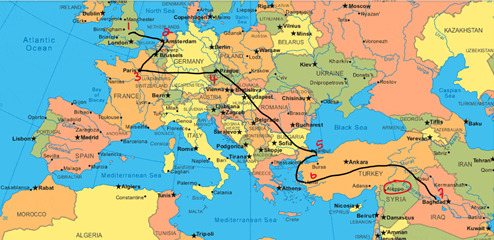
1 (Oxford) 2 (Amsterdam) 3 (Paris) 4 (Prague) 5 (Istanbul/Constantinople) 6 (Izmir/Smyrna) 7 (Seleucia/Seleukeia). And Aleppo is circled in red. Lyra traveled by ferry twice: once going from England to Amsterdam (the ferry with the loud, annoying guy and the welsh miners) and once from point 5 (Constantinople) to point 6 (Smyrna). That’s the one where the boat crash occurred. The Blue Hotel would be located somewhere between Iraq and Syria.
If the Blue Hotel wasn’t a place, but a person, it would be a person without a daemon. Maybe that’s why daemons are attracted to it.
EDIT:
The place called “Seleucia”/Seleukeia is a bit confusing. Wherever it is, or was, it refers to the ruins of a very old city. Actually, It looks like there’s two places called “Seleucia”, both ruins, now (in our world, that is): the ruins of Seleucia in Baghdad, also called Seleucia-on-Tigris, and the ruins of Seleucia in Antalya, Turkey. The second one is also called/pronounced “Seleukeia”, and is located on the coast of Pamphylia. I couldn’t find it on the map.
Most pictures of Seleucia I can find on Google are of the second one. It looks like this:

When I google Seleucia-on-Tigris, I get black and white pictures and photos of old maps from the Seleucid Empire. I’m guessing there isn’t much left of it. If our friend Wiki is to be believed,
“The city eventually faded into obscurity and was swallowed by the desert sands, probably abandoned after the Tigris shifted its course.”
You know what this reminds me of? The Blue Hotel.
EDIT:
ACTUALLY, THERE ARE SEVERAL PLACES CALLED (OR WHO USED TO BE CALLED) SELEUKEIA! 😱
*Deep breath*
Ok, let’s check further. Our world’s equivalent of the Karamakan desert is the Taklamakan desert and it’s located in North West China. In TSC’s last chapter, Ionides tells Bonneville that the “treasure”, which I’m guessing is in Karamakan/Taklamakan, is 3000 miles from their current location, i.e., the Blue Hotel.
The distance between Baghdad (Seleucia-on-Tigris) and Taklamakan, in our world, is approx. 2127 miles.
The distance between Antalya (where the Seleukeia from the picture above is) and Taklamakan, in our world, is approx. 2768 miles.
The distance between Silifke (previously known as Seleucia on the Calycadnus - this is getting complicated isn’t it) and Taklamakan, in our world, is approx. 2612 miles.
The distance between Antakya (previously the Seleucid Capital, also known as Seleucia Pieria, phew) and Taklamakan, is approx. 2498 miles.
The Blue Hotel is about a day’s walk on camel back from Lyra’s Seleukeia, so it’s not very far. If we try to go by the 3000 miles indication, we can probably eliminate Seleucia-on-Tigris in Iraq (sorry, I was wrong!)
Lyra’s Seleukeia is a coastal town. The book tells us that much. (Ok, it definitely couldn’t have been Seleucia-on-Tigris.)
Antalya’s Seleukeia, also known as “Lyrbe” (sounds a bit like Lyra?), is located here:
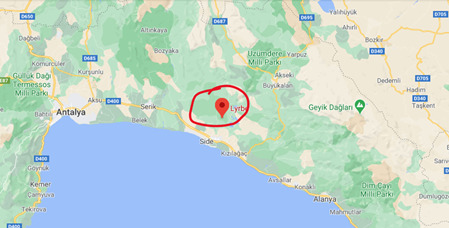
While Silifke is located here:

And Antakya is here:

So they’re all coastal, kind of. For a very general view, you’ve got:
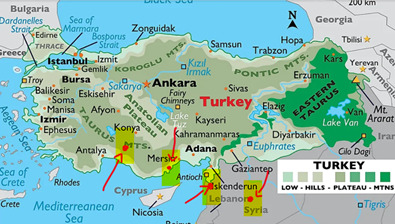
From left to right (in yellow): Seleukeia/Lyrbe, Seleucia on the Calycadnus/Silifke, Seleucia Pieria/Antakya, and Aleppo. The puzzle is to decide which of the first three is Lyra’s Seleukeia. They’re all under 3000 miles from Taklamakan but I wouldn’t discount any of them because of it (the distance is probably calculated from the starting point to the border of Taklamakan, and the “treasure” is in the “heart” of the desert, so way further).
I’m guessing that the one Lyra went to was the third - Seleucia Pieria/Antakya. It would explain why it’s a dangerous location (it’s located on the Syrian borders). It would make more sense to use the expression “between Seleukeia and Aleppo” to indicate where the Blue Hotel might be (since that Seleukeia and Aleppo are geographically the closest to one another).
So let’s say Antakya. What does the place look like in our world?


More ruins, unlike the Seleukeia of Lyra’s world, where people still live and do trade. It’s all very curious. I really do wonder if Pullman got the idea for the Blue Hotel from all these seleucid ruins, or if there’s another place in Syria that would match more.
#his dark materials#lyra belacqua#lyra silvertongue#the secret commonwealth#hdm meta#my ramblings#Abdel Ionides#malcolm polstead#my metas
50 notes
·
View notes
Text
And then there’s the opposing ways in which Marisa and Asriel love Lyra.
Neither one of which I’d call a healthy and ideal version of love.
(slight book spoilers, not safe to read for non-reader audience until the last ep of s1)
We have Marisa who didn’t give a thought to Lyra until she met her and then suddenly Lyra, finding Lyra, getting Lyra to love her back became her driving obsession. Up until that point she was this cool collected and distant person, always in control, her monstrosity hiding under a thin veneer of grace and beauty.
And then she meets Lyra and she realizes she loves her daughter. Which is an unwelcome, largely unfamiliar feeling that is absolutely inconvenient. And she is absolutely powerless to it.
(and I’m so looking forward to watching that unravel across the screen even further because Ruth Wilson is the absolute perfect Mrs. Coulter)
And then we have Asriel. Who has loved his daughter the entire time and has also kept that well hidden the entire time too, even from Lyra.
And where Marisa’s love ends up taking the form of obsession, Asriel is quite capable of distancing himself from that love. He has bigger goals and his daughter doesn’t enter into that equation.
...right up until the point where he sees her in the North and for a few brief moments all turns to horror because he didn’t send for her.
And here we have the duality of that moment. The monstrosity of that moment. Because his reaction is horror and it shouldn’t be. The only potential threat there is Lord Asriel himself.
These are his words: “No, you have to get out before I...”
Before he... what? No one’s making him do anything. How was that sentence gonna end? ‘before I have to use my own child to...’?
He loves his child. He doesn’t want her to be the child he needs. And he wants her as far away from him as possible because in this moment, at this time, he is the biggest threat to Lyra around. Which shows both that he loves her and that it might not be enough to protect her.
Which funnily enough is in complete opposition to Lyra’s time in Bolvangar where literally the only thing that saved Lyra was the fact that she’s Mrs. Coulter’s daughter. Which... I guess between these two moments makes Marisa the better parent?
Wow.... high bar that one (let me just insert: *deadpan stare*)
And it’s not even that I think Marisa loves Lyra too much and Asriel loves Lyra too little. That’s just the way it expresses in them. I think they both do love Lyra, I even think at the very heart of themselves they both love Lyra truly. But the people they are, the way they’ve made themselves, makes them... - well, unsuitable parents for one but also, - it makes them complete opposite in their expressions of love.
We have Marisa who is always in control being completely without control where Lyra is concerned. And we have Asriel who is passionate beyond all logic having the tightest of reins over anything he actually loves, which is only Lyra (and Marisa).
#marisa coulter#lord asriel#hdm#his dark materials#masriel#asriel belacqua#marisa x asriel#terapsina rambles#terapsina watches hdm#hdm meta#family: marisa x lyra#family: lyra x asriel#otp: marisa x asriel#hdm spoilers#hdm book spoilers#chaos family
836 notes
·
View notes
Text
So, I've seen three episodes of His Dark Materials, and it's a beautiful, monumental, wonderful adaptation, very close to the original text... And at the same time it's certainly not true to the Pullman Weltanschauung. I don't think it was the deliberate intention of the screenwriter, because Jack Thorne made a remarkable work, and "from-book-to-script" changes seem not only necessary — it's unavoidable in case of adaptations — but elegantly crafted. And yet...
And yet some of these changes betray him completely — he just doesn’t see the world the way Pullman sees it (and it's absolutely natural phenomenon, I don't see it that way either). The most notable case, probably, was in the recent episode, when Ma Costa told Lyra that she can be whatever she wants. This is the moral and magic spell of the XXI century, and I see the roots of that phrase and reasons to bring it in the adaptation. But it contradicts the book, and screenwriter doesn't even see it or doesn't pay enough attention. In the book, this scene is played differently, in much more unusual way and, more importantly, in full accordance with the rest of the book. Because the heart of His Dark Materials trilogy is the change from childhood innocence to experience — and the search for identity too.
Ma Costa had to remind her of a few things.
"You en't gyptian, Lyra. You might pass for gyptian with practice, but there's more to us than gyptian language. There's deeps in us and strong currents. We're water people all through, and you en't, you're a fire person. What you're most like is marsh fire, that's the place you have in the gyptian scheme; you got witch oil in your soul. Deceptive, that's what you are, child."
Lyra was hurt.
"I en't never deceived anyone! You ask..." There was no one to ask, of course, and Ma Costa laughed, but kindly.
"Can't you see I'm a paying you a compliment, you gosling?" she said, and Lyra was pacified, though she didn't understand.
One of the main themes of Northern Lights is the unavoidable course of nature. Lyra can't be who she isn't, but she can find out who she is and want to be. You cannot change your own nature, and although you are making your own way in life, you cannot become a person you're not: Lyra can't stop being Mrs. Coulter's daughter, panserbjorns can't become humans, witches in love can't become gyptians. This idea runs all through the trilogy, because it's part of author's Weltanschauung. And I'm so sorry that adaptation (not deliberately perhaps) kills this idea in favour of more popular and agreeable point of view.
531 notes
·
View notes
Text
I want to talk about this scene.

Against her better judgement, Lyra wants desperately to believe that Mrs Coulter really is the nice, kind woman who thought her to be extraordinary. That the woman hurting her right now isn’t really her.

This, we know, isn’t true. But the thing is, Lyra is right. Just in a different way than intended.
Marisa Coulter wants to be in control at all times.
“She’s constructed this version of herself which is glamourous, and graceful and in control. But actually there’s a side of her she has suppressed which is much more free, and feral in a way.” - Ruth Wilson
But the men that came threatened her research. Her research, her experiments, essentially her baby. She’s certainly devoted more time and energy to it than she ever has Lyra. And someone from the Magisterium wants her to slow down. Sending lackeys to her instead of coming to her himself. She is seething.
How. Dare They.

And Lyra disobeys her again. Marisa snaps at Lyra, but she’s not really angry with Lyra. She’s angry with the men who came to her home.
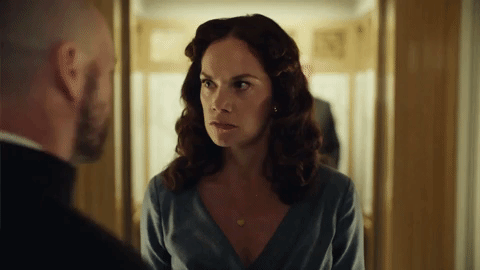
Marisa is pissed, but she tries again to reign herself in. She apologies for being sharp with Lyra. Lyra says, plainly, “You lost control,” and Marisa’s reply is telling.

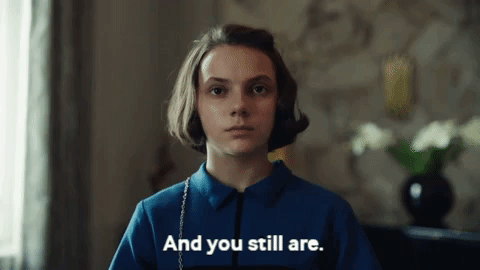
Lyra won’t let her deny it. Marisa was angry at the men and for a moment, she lost control. The one thing Marisa absolutely refuses to do.
Marisa turns around, removing herself from the situation, but her daemon stays put. Not moving.
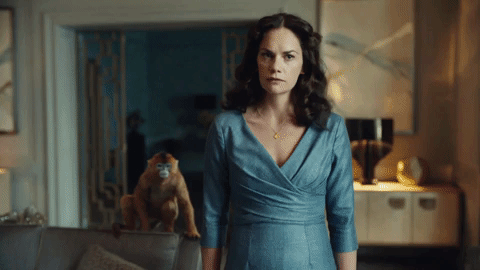
There’s a poignant moment where Marisa stands there warring with herself and then she turns back. For once, she gives in to her daemon- her base desires. The ones she always tries to keep a lid on. The ones she’s distanced from herself so much she barely lets her own daemon look at her. For once, Marisa and her daemon are aligned.

This isn’t Marisa as she usually is. As Lyra said, those men upset her, and she’s taking it out on her daughter.
(A+ patenting!)
But what’s interesting is that even as her daemon is attacking Pan and Lyra is crying for her to stop, Marisa still tries to keep her cool.
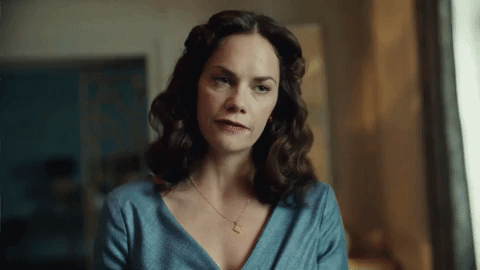
Then Lyra mentions Asriel.

Marisa is still trying to control herself, but suddenly her anger isn’t just at the Magisterium officials. It’s Asriel. A complicated decade long series of emotions, anger and bitterness and so much more that I’m really hoping the show will delve into. Asriel is her weak spot. Try as she might, even after all these years he can still get to her in a way nothing else can, (except maybe Lyra?), and that’s when Marisa Coulter finally loses it.
And she slips.

And she RETREATS.

Again, Marisa and her daemon are in sync with their reactions, something that we haven’t really seen until now. The anger drains out of her, but her emotions are still heightened.
“Who’s my mother?” Lyra asks. But Marisa is back to trying to regain control. No more slips.
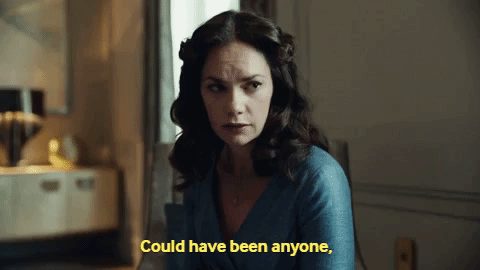
She’s blinking fast, once again holding herself back. I’d argue, holding tears away.
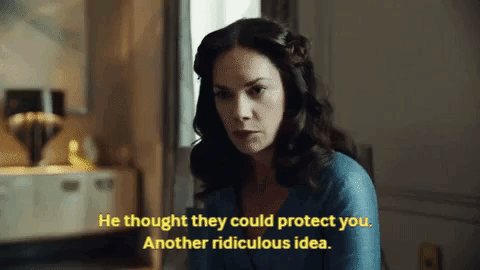
She’s still very bitter about Asriel. Bitter and petty.
When Lyra runs to her room, Marisa frantically follows, but Lyra kicks her out. Marisa lets her. Accepts that Lyra needs time alone to process everything.
And then, alone and unwatched, for just the barest sliver of a moment, Marisa lets herself break.

She’s back to normal throughout the remainder of the episode, but then at the end, Lyra escapes. And once again, Marisa’s control slips. She spends all of the next episode going absolutely wild and feral, and somewhat suicidal, to get Lyra back. Lyra wasn’t meant to mean this much. She shouldn’t invoke this sort of reaction from Marisa. But unlike with Asriel, where she can compartmentalise and calmly manipulate, (i.e: 1x04 where he’s no more than a tool to bend the Magisterium’s arm), she can’t shut down her emotions where Lyra is concerned.
And so on some level, she seems to accept it. This girl matters. Fine. She’ll still be her twisted and cold self. This won’t break her. It’s just that now, Lyra has become one of the main considerations of her machinations.
And I can’t wait to see what she does next. What will happen when Lyra finds out what her mother is doing. What will happen when she and Lyra will meet again. And her reactions to Asriel, because if you’ve been following my blog you know I’ve become complete Masriel trash.
#myhdmedit#mine#marisa coulter#mrs coulter#lyra belacqua#lord asriel#asriel belacqua#masriel#his dark materials#hdm#hdm spoilers#character analysis#character meta#character study#his dark materials 1x02#hdm 1x02#my god this took forever to make#cause i made all the gifs as well#and i'm still a beginner gifmaker#phew#myedit#ruth wilson
466 notes
·
View notes
Text
I think my favourite Lee-and-Lyra bonding moment in this week's episode was just after they got Billy back, and Lee was like, "The Costas do still love you and care about you, but it's best to give them space to deal with this right now, and leave them alone."
Like, it's a gentle way of encouraging Lyra to respect Maggie and Tony's boundaries, and remind her that this is their loss, their pain, and they should be given a bit of privacy and space to deal with it. But it's also combined with a reminder that this doesn't change the fact that they care about her, too, that the two aren't mutually exclusive. He's making sure that she knows she's still loved and wanted.
And on top of that, he's also showing himself to be another positive adult figure that can guide her through this situation, someone that she can turn to and rely on while the gyptians process what's happened and mourn their loss. He's acknowledging that she has seen something horrifying, and needs someone to be there for her- while also acknowledging that it's best if that someone isn't one of the gyptians, because they have their own grief to deal with.
I think that's the key part of why this moment stood out- it would be easy to dismiss the horror of what Lyra saw, to have the adults accuse her of being selfish for seeking comfort when what happened to Billy is so much worse. Instead, Lee takes her aside, and gives her the comfort and assurance that she needs, while also teaching her the importance of respecting people's boundaries in situations like this.
Honestly, they've only been travelling for like a week, and already Lee's being more of a father to Lyra than Asriel's been so far.
#his dark materials#bbc his dark materials#his dark materials spoilers#lee scoresby#lyra belacqua#billy costa#ma costa#maggie costa#tony costa#lord asriel#asriel belacqua#alice's hdm metas
423 notes
·
View notes
Text
that scene with the alchemist in TSC remains my favourite, for the single reason that it showcases lyra's relationship with asriel very well. philman kinda neglected them in tsk and tas (save for that one moment where asriel decides out of a sudden to praise her lmao talk about hurried writing, eh?) but that moment in TSC is very fundamental.
she thinks of asriel frenquently in that book, and most of the time she looks at her memories with a certain detachment, it's very analytical, he existed, he was her father, that was the end of it. but then she faces that man who instantly reminds her of asriel - because of the way he held himself, the way he was doing his work which was ruthless and meticulous, and she remembered her last fondest memory of asriel, when they meet in svalbard and she thinks her quest is done. then she is engulfed by everything, and she shuns away the thought of him because it hurts. lyra thinks of mrs coulter very little in this book, and that makes sense to me because lyra wouldn't love marisa without an extra effort, not because she is evil, but because mrs coulter is a stranger to lyra. she is her mother, but that is news to her, that is recent and even then they never grew into that relationship. even if marisa had survived, lyra wouldn't have gotten attached to marisa as much because of that distance factor.
but with asriel, she was always close, he was always family, he was no stranger. lyra did not hesitate to accept him as her father (and I don't think it's fair to compare her reaction to marisa here because technically she struggled because of marisa's evil ways, not anything else) and even after everything he did she still referred him as 'father' afterwards, and only began to call mrs coulter mother - still rarely in comparison - only later.
so when she sees that alchemist, so like asriel in all the ways possible, including the ways that hurt her, lyra allows one single memory to be organically assimilated and it hurts her still, because she never faces the ghost of asriel head on, he haunts her still and i think that's beautiful.
#his dark materials#hdm meta#hdm meta: lyra belacqua#hdm meta: lord asriel#meta by effie#i need a better tag lmao
50 notes
·
View notes
Text
i’ve seen so many people calling lyra selfish for leaving pan behind in the land of the dead, and i just—how do you misunderstand a piece of media that much
lyra and pan are one being. that scene is quite literally her battling her own consciousness because part of her is terrified of being left alone and the other is reaching out to roger. pan’s discomfort and fear from the moment they stepped foot in the suburbs of the dead tells the audience that lyra’s mind is divided, and the scene alone of them talking to each other before she boards the boat emphasises how everything she is doing is for somebody else, for roger. she’s willing to die for him, and for all she knows that’s what will happen if they separate. she puts aside her own fear and a piece of her heart in order to make amends. it was a true act of selfless love, and i think the comment below utterly nails it:

#his dark materials#bbc his dark materials#hdm#hdm spoilers#lyra belacqua#lyra silvertongue#pantalaimon#meta#s3e4#s3#alice’s rambles
338 notes
·
View notes
Text
as much as i think the land of the dead scenes could have stuck to the book better, these few episodes really did tell a beautiful story which was in line with the message from the amber spyglass even if it differed slightly. the book was a story of character development for a twelve year old protagonist who had always relied on lies and escapism to save her skin, and a final turning point in learning the importance of truth in addition to her own instrument that reveals just that. the show told a tale of darkness, and a brave teenager standing up to her fear by holding onto real things, maturing and choosing to take charge with her instincts. she observed how the harpies held onto stories just like the ghosts, and struck a deal based on this to lead them out of their prison. she earned the name silvertongue all over again, and gave another in return
#his dark materials#bbc his dark materials#hdm#lyra belacqua#lyra silvertongue#the amber spyglass#meta#s3e5#s3e6#s3#hdm spoilers#hdm book spoilers
85 notes
·
View notes
Text
something about the fourth episode titled “lyra and her death” that can be taken literally because really, leaving your dæmon behind is akin to death in her world in that it is compared to losing your head or having your heart ripped out, which is exactly what it felt like to row away from pantalaimon
#writing meta posts on episodes i haven’t seen yet#his dark materials#bbc his dark materials#lyra belacqua#lyra silvertongue#pantalaimon#s3#s3e4#hdm#hdm spoilers
33 notes
·
View notes
Note
Would you say the characterisation of Lyra in the hdm books is sexist? Feels like she is diminished in book 2 and 3 and ends up much more constrained and trapped in the "docile woman" role (which is weird to me bc she is so bold in book 1)
Oh, hello anon, this is a tricky question because I think yes, it is and also no, it isn't and I will elaborate lmao
Yes, I definitely think Lyra's portrayal in TSK and TAS is rooted in sexism, but I don't think Philman did so deliberately. I don't think he woke up one day and decided to downgrade Lyra's character throughout the series. Her character - and that of most if not all women in the series - follows a certain pattern in how they're written and that is certainly rooted in how he was brought up, and sure he is progressive enough for a man who grew up through the 50s and 60s. For today's standards that just won't do, but when reading older authors and older books, it's important to keep this idea in your mind, especially while doing analyses. So this is why I think Lyra's portrayal is rooted in sexism, but it probably wasn't something deliberately done.
I hate that portrayal of hers in the following books and I don't think there are any excuses for that; I see some people say she changed because of trauma, but nonetheless, her docile attitude is never explained in the books, which in itself alone it's bad. It's not even addressed, she just changes overnight. I remember being super excited for TSK and then reading a few chapters and being so, so disappointed. Will was awful, Lyra was downgraded to his stupid sidekick, no Asriel, very little Marisa... It was a bad experience overall lmao
Lyra being docile and lacking assertiveness - which do not match her behavior in book 1 - is the most disappointing thing for me. Growing up, I never had female main characters that I could see (I only read HDM at 18) unless they were a girl having to choose between two dudes, which to me always felt silly. This is a recurring problem in literature, you always find female protagonists being overwhelmed by a male side-character. It's not different in HDM, it's just considerably better written and hidden behind a curtain of "this is based on Paradise Lost." It's YA at its core and like YA, it commits virtually the same sins.
But Lyra's changes in behavior shouldn't have been surprising, because Mrs Coulter also changes, and all the women are written vaguely the same. Philman has a couple of patterns he follows (intentionally or not, it doesn't matter, this is where your cultural and social upbringing takes its place in your writing) and they are somewhat similar between themselves:
1) The Mother: most women in the series either play maternal roles or are actual mothers. They all have a sense of caring, healing and nurturing that is displayed as natural to them, and they often are found caring for their offspring or in a similar role towards unrelated characters. (Such as Hannah for Malcolm, in case you read TBOD, or Mary towards Will and Lyra). Lyra already displays some nurturing skills when she helps Iorek in book 1, but as the series progresses, she becomes less independent and begins to exist solely to serve as Will's motherly guide: changing his bandages, serving his Will, the only exception being her decision to go to the land of the dead. This also happens to Mrs Coulter, as her arc ended with her realising how much she loved Lyra and how this feeling overwhelmed her and changed her. It's disgraceful, but I'm saving this for my Mrs Coulter post because I have too much to say lmao All the Gyptians we meet are women serving men and acting as mothers and the witches whole culture is about reproducing. Womanhood is haunted by motherhood, apparently.
2) The Lover: now this as trope is tricky, but it happens in HDM. Both Lyra and Marisa tame their wildness in front of their "lovers" (I hate calling Will a lover but there u go), becoming malleable and less assertive, Marisa still escaping this trope because she was a vastly better written character than half the women in HDM, but at the end of books 1 and 3, she is very much downplaying herself in favour of Asriel. For Lyra, this happens way before she considers liking Will, and this is why I hate it: I know Philman could have done a better job with this, he didn't have to hide Lyra's savagery and wildness just so she could kiss a piece of shit of a boy. The Witches are examples of women written as lovers too, in fact, like the mother trope, their whole culture is based on this. They are young-looking, beautiful, sensual women (all slender *coughs*) that seek men and become obsessed with them unless they fuck them. THAT is fucking insane; sure, on its own I wouldn't mind as much, but together with everything else, writing the women, who are supposed to be the opposite of what "good women" in Lyra's society should be, as crazy sex driven is just. Something Else. Not to mention the fact they threaten men's lives. I mean this one is pretty bad as it is.
3) The Elderly Woman: now, this one also is tricky because as a trope it is versatile, but I'll try to be quick. If you are not in the range of fuckable (of age and/or body type) you fall into this category. Crazy, I know, but when you look at it it's exactly what happens. The women portrayed as desirable or attractive, they all fall into the lover category, and occasionally the mother category, but some women aren't written as sexually desirable, so they just end up as old ladies who are helpful/unhelpful. Hannah Relf is the biggest example of that, but you have other women here too: Miss Charmichael, Sister Fenella, Sister Benedicta, Will's piano teacher. In fact, if you read La Belle Sauvage, you'll realise that not even the nuns escape the trope: the younger nuns are still sexually desirable, so they fit into the lover category, and they all tend to be motherly towards Lyra.
So there you go: sorry for derailing this, but I think this is a tricky question that I can't just answer with yes or no. It runs much deeper than that in the series; it's not just a Lyra problem, although Lyra's issue is the biggest one in my opinion; it was so disappointing to read I nearly dropped the series altogether. And I plan to write two metas that will touch on this subject, but for now, this should do. Thanks for the ask!
#asks#hdm meta: lyra belacqua#there were a few things i wish i could add#but idk if u read TBOD and i dont to spoil u very much
9 notes
·
View notes